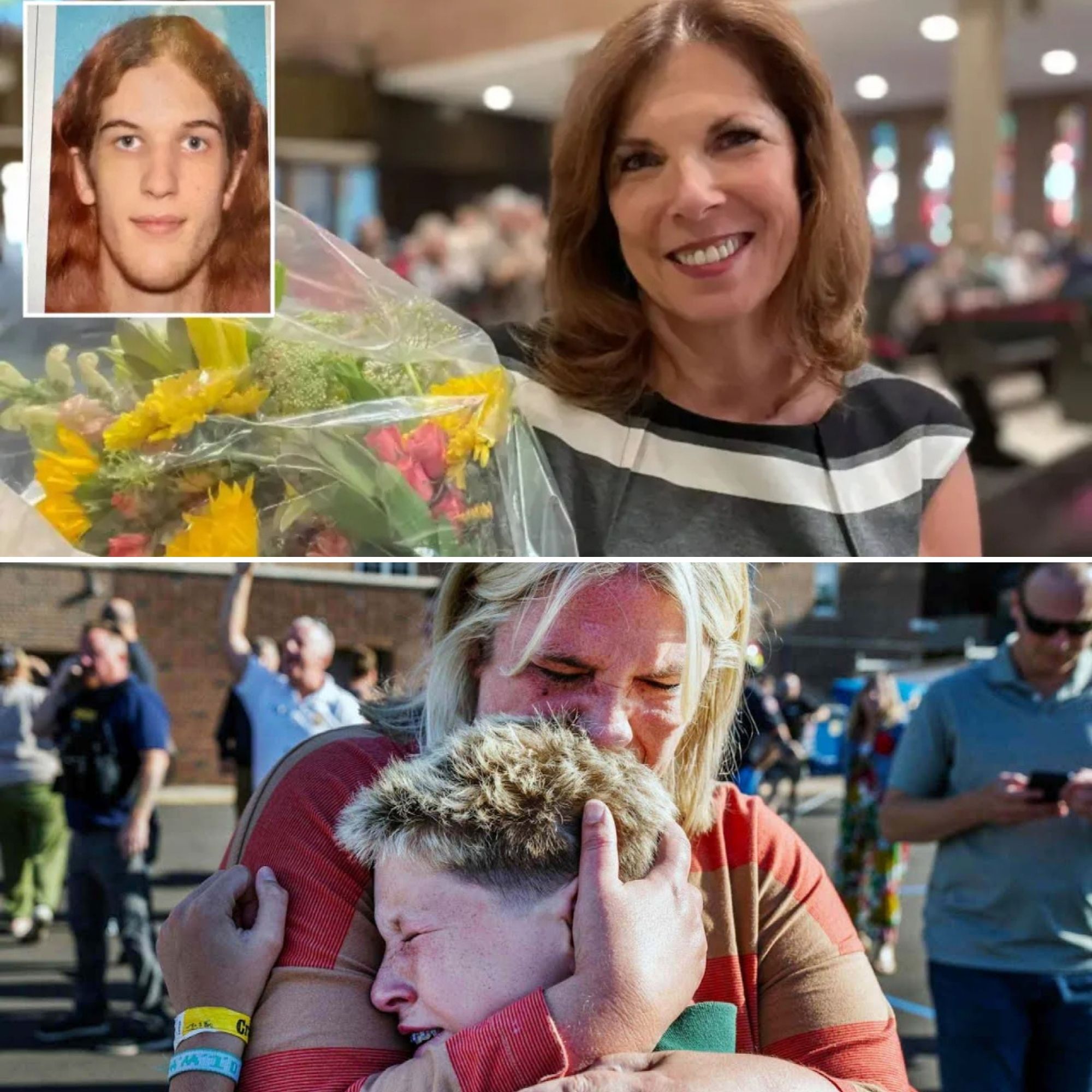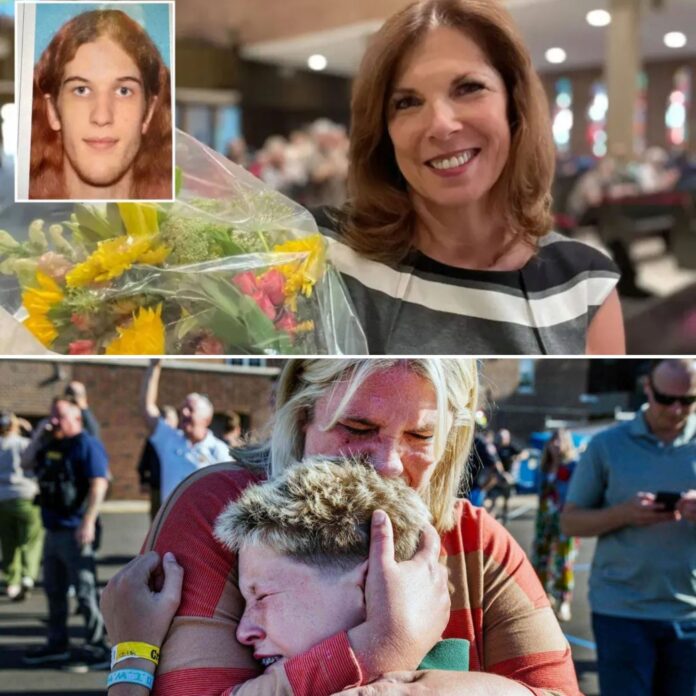A mother’s love, a tragic twist, and an unimaginable irony…
The Minneapolis school shooting shocked the world, but what’s even more staggering is the heartbreaking connection between the shooter, Robin Westman, and their mother. Her role in the community and the choices she made will leave you speechless. Could this tragedy have been prevented? Click to uncover the stunning details behind this devastating story.
👉 Read more here

On August 27, 2025, the Annunciation Catholic School in Minneapolis, Minnesota, became the site of a horrific mass shooting that claimed the lives of two children, aged 8 and 10, and injured 17 others, including 14 children and three elderly parishioners. The shooter, 23-year-old Robin Westman, who died by a self-inflicted gunshot wound, left behind a trail of disturbing documents and videos that revealed a deeply troubled mind. Yet, one of the most shocking aspects of this tragedy is the role of Westman’s mother, Mary Grace Westman, whose connection to the school and her support for her child’s identity add a layer of profound irony to an already heartbreaking event. This article explores the unbelievable details surrounding Mary Grace Westman, her ties to the Annunciation community, and the broader implications of this tragedy.
The Attack at Annunciation Catholic School
The shooting occurred just before 8:30 a.m. during a morning Mass at Annunciation Catholic Church, adjacent to the school, where students were gathered to mark the start of the school year. Robin Westman, armed with a legally purchased rifle, shotgun, and pistol, fired dozens of rounds through the church’s stained-glass windows, targeting children and worshippers in the pews. In a chilling act of premeditation, Westman barricaded two church exits with wooden planks marked “no escape,” trapping victims inside. The attack left two children dead, 14 others injured, and the community grappling with grief and disbelief.
Minneapolis Police Chief Brian O’Hara described the incident as an act of “sheer cruelty,” praising the bravery of school staff who shielded students and first responders who risked their lives. Stories of heroism emerged, including that of 13-year-old Javen Willis, who urged classmates to hide under pews, and 10-year-old Weston Halsne, whose friend Victor took a bullet to save him. The FBI, under Director Kash Patel, is investigating the shooting as an act of domestic terrorism and a hate crime targeting Catholics, with no clear motive yet established.
What makes this tragedy particularly striking is the personal connection between the shooter and the school. Robin Westman attended Annunciation for at least one year, and their mother, Mary Grace Westman, was a beloved figure in the school community, having served as the parish secretary from 2016 to 2021. This connection, combined with Mary Grace’s role in supporting her child’s gender transition, creates a narrative of profound irony that has captivated public attention.
Mary Grace Westman: A Mother and Community Member
Mary Grace Westman was a familiar face at Annunciation Catholic School, where she worked in the business office for five years before retiring in 2021. According to a 2021 Facebook post by the church, her retirement was celebrated with warmth and gratitude, reflecting her status as a respected and cherished member of the community. Neighbors in south Minneapolis described Mary Grace and her husband as “wonderful” and “friendly,” with one recalling how they donated cement blocks for a landscaping project. This image of a kind, community-oriented woman stands in stark contrast to the actions of her child, who targeted the very institution where she once worked.
In 2019, when Robin was 17, Mary Grace signed a court petition to change her child’s name from Robert Paul Westman to Robin M. Westman, citing that the minor “identifies as a female and wants her name to reflect that identification.” The petition was approved in January 2020, a decision that reflected Mary Grace’s support for her child’s gender identity. This act of maternal acceptance has become a focal point in the aftermath of the shooting, with some praising her for supporting her child and others questioning whether more could have been done to address Robin’s mental health struggles.
The Disturbing Documents and Videos
Robin Westman’s attack was meticulously planned, as evidenced by a manifesto and a series of YouTube videos posted hours before the shooting. These materials, now removed with FBI assistance, included handwritten notes, diagrams of the church’s interior, and displays of firearms with disturbing inscriptions. Messages such as “for the children,” “where is your God,” and “kill Donald Trump” were scrawled on ammunition magazines, alongside antisemitic slurs and references to mass shooters like Adam Lanza and Robert Bowers. One video showed Westman giggling while muttering about suicide, revealing a deep obsession with violence and a desire to emulate infamous school shooters.
The manifesto, partially addressed to family and friends, expressed profound self-hatred and depression. One entry read, “I am not well. I am haunted by thoughts that do not go away,” while another described a fascination with mass shootings that began in middle school. Westman also detailed a visit to the church during teacher training week, noting the presence of active shooter drills, and documented the purchase of an AR-15 rifle with a recent paycheck. These writings suggest a long-standing mental health crisis, raising questions about whether warning signs were missed by those closest to Westman, including their mother.
The Irony and Public Reaction
The irony of Mary Grace Westman’s connection to Annunciation Catholic School lies in the contrast between her role as a nurturing figure in the community and the devastating actions of her child. As a former employee, she was part of the school’s fabric, entrusted with administrative duties and likely familiar with the children and families affected by the shooting. Her support for Robin’s gender transition, a deeply personal and affirming act, adds another layer of complexity, as it juxtaposes her love for her child with the horrific outcome of their actions.
Public reaction has been polarized. Minneapolis Mayor Jacob Frey urged the community to avoid “villainizing” the transgender community, emphasizing that the focus should remain on the victims. “Those attacking transgender people have lost their sense of common humanity,” Frey said, addressing social media posts that seized on Westman’s gender identity to fuel divisive narratives. Some conservative commentators have pointed to the name change and Westman’s online activity as evidence of radicalization, while others argue that mental illness, not gender identity, was the driving factor.
The documents and videos have also sparked debate about the role of family in identifying and addressing mental health issues. While there is no evidence that Mary Grace was aware of her child’s plans, the manifesto’s references to long-standing depression and violent thoughts suggest a prolonged struggle. A heavily redacted 2018 police report from Eagan, Minnesota, where the Westman family once lived, noted a “mental health” check on a juvenile, with Mary Grace listed as a parent, but no further action was taken. This raises questions about whether earlier intervention could have altered the tragic outcome.
Broader Implications: Mental Health, Gun Access, and Community Safety
The Minneapolis shooting has reignited discussions about mental health, gun control, and school safety. Westman’s legally purchased firearms, acquired shortly before the attack, highlight gaps in the system, as the shooter had no significant criminal history. Minnesota Governor Tim Walz, along with national leaders, has called for unity and action to address gun violence, while the community grapples with how to protect sacred spaces like schools and churches.
Mental health support is a critical focus in the aftermath. The 988 Suicide and Crisis Lifeline has been promoted to assist survivors and community members, and the archdiocese is providing counseling. The bravery of students and staff during the attack, coupled with the school’s prior training in active shooter drills, underscores the importance of preparedness, though it couldn’t prevent the tragedy.
The role of online platforms in amplifying extremist rhetoric is another pressing concern. Westman’s videos, which referenced mass shooters and included antisemitic and antigay slurs, suggest exposure to toxic online subcultures. The FBI is investigating these materials to determine whether Westman was radicalized online, a growing issue in mass shooting cases.
Healing a Broken Community
As Minneapolis mourns, the focus is on healing and honoring the victims. Vigils have drawn hundreds, with flowers and candles lining the school’s entrance. Archbishop Bernard Hebda, supported by a telegram from Pope Leo XIV, has called for prayers and solidarity. Principal Matt DeBoer, reflecting on the school’s theme of hope, said, “We lost two angels today, but our community’s strength will carry us forward.”
The irony of Mary Grace Westman’s connection to Annunciation Catholic School will linger as a painful reminder of the complexities of this tragedy. Her support for her child, juxtaposed with their violent actions, raises difficult questions about family, mental health, and community responsibility. As the investigation continues, Minneapolis seeks to rebuild, holding tight to the memory of the two young lives lost and the resilience of those who survived.
